- Home
- Mary Downing Hahn
Stepping on the Cracks Page 2
Stepping on the Cracks Read online
Page 2
Riffling the pages of the magazine to find more cartoons, I told myself a letter from Jimmy would come tomorrow. Maybe even three or four. It happened that way sometimes.
"Margaret," Mother called. "Dinner's ready."
Taking my place at the table, I poked at my food. "Not stew again," I said.
Daddy frowned at me. "Think of the starving children in France and Holland," he said, "and be glad you have a roof over your head and something to eat."
Silently I choked down the stew. I didn't want to think about those children. Life magazine was full of their pictures, skinny, frightened little kids peering from the bombed-out ruins of their homes. "Why them," I sometimes asked myself, "and not me?"
After we'd finished eating, Daddy lit a cigarette and spread the Evening Star on the table beside his plate. Smoke drifted past my nose and prickled my eyes, but I stayed in my chair and tried to see what he was reading.
"Things look good, Lil," he said after a while. "Everybody says we'll be in Paris before September. The war should be over in the fall. We're breaking Hitler's back at last."
Thinking about Elizabeth's and my game, I grinned at Daddy. I wanted to tell him about all the cracks we'd stamped on, but he wasn't looking at me. He was staring through a cloud of cigarette smoke at something only he could see.
"Wouldn't it be wonderful if Jimmy was home for Christmas this year?" he asked Mother.
She smiled at Daddy and squeezed my hand. For a moment we sat quietly, thinking about Jimmy, imagining him with us, a whole family, four people at the table, laughter and jokes again. I glanced at his picture on the sideboard, a soldier smiling at us from a silver frame.
"We'll have turkey," Mother said, "and sweet potatoes, cranberries, pumpkin pie made with real butter, all the sugar and coffee we want." Her voice trailed off happily as she began clearing the table.
When I went upstairs to bed, the heat was lying in wait, stifling me with the smell of mothballs, old wool, and furniture polish. Yearning for a breeze, I pressed my face against the window screen, but the air outside was just as hot and still as it was inside. On the horizon, just above the shaggy treetops, heat lightning flickered dimly across the sky, and thunder muttered like artillery fire in the distance.
A mile down the tracks, a train blew its whistle for the Calvert Road crossing. Nearer and nearer it came, its whistle wailing louder and louder, its engine thundering, its wheels pounding against the tracks, filling the night with noise. As the locomotive rumbled past the end of our yard, it shook the whole house, jiggled my bed, rattled the glass in my window, and made my collection of china animals clink against each other.
Then, as quickly as it came, the train roared away toward Baltimore, blowing its whistle for the next crossing. In the sudden silence it left behind, I heard the crickets chirping in the bushes and Mother's and Daddy's voices in the living room.
Too hot to sleep, I pulled my scrapbook down from a shelf in my closet. Ever since Jimmy was drafted, I'd been keeping things about the war to show him when he came home. I saved cartoons and all the Saturday Evening Post covers with pictures of Private Willie Gillis. Willie looked sort of like Jimmy, and I thought he probably had the same personality. I could imagine him telling jokes and getting into a little trouble every now and then.
Jimmy's letters to me were in my scrapbook, too. He always started them "Dear Princess Maggie May" and then told me funny things that happened to him and drew pictures to go with them. He was a good artist, and he made me think the war might not be so bad after all. At least not for him. The potatoes he peeled, the latrines he cleaned, the terrible food, the dumb sergeants. You didn't die of things like that, you just laughed them off and hoped the war would end soon.
After I read all the letters, I felt better. Like Willie Gillis, Jimmy was safe somewhere in a foxhole in France or Belgium. How could anyone, even a Nazi, want to hurt my brother?
Putting my scrapbook away, I turned out my light and prayed to God to keep my brother safe. Then I sank down into a dream that the war was over and Jimmy was home and we were on our way to Ocean City in a brand-new car. Like a family on a magazine cover, we were happy. There was nothing for Daddy to get mad about or me to cry over. With Jimmy telling jokes to make us laugh, even flat tires and melted ice cream were funny.
3
A couple of days later, Elizabeth and I were sitting on a platform we'd built in the oak tree at the end of my yard, as far from the house as we could get. Out of our mothers' sight, we were less likely to be called inside to help with boring chores. According to Elizabeth, it was a known fact that people didn't think to look up when they were searching for someone.
From where we sat, we could see Mother picking tomatoes in our Victory Garden. She was proud of all the vegetables we'd grown. It was one of our contributions to the war effort, she told me, like saving scrap and buying bonds. Anything we could do to help our country helped Jimmy, so she worked in the garden every day, weeding and watering, keeping the rows as neat and straight as a picture.
The back of Mother's flowered housedress was dark with sweat, and she paused every now and then to swat at the mosquitoes circling her head. I knew I should go down and help her, but the heat drained my energy. Wisps of hair escaped from my braids and stuck to my neck, and my jersey felt like it was wallpapered to my skin.
"What do you want to do?" I asked Elizabeth.
"I don't know." Elizabeth caught a ladybug and watched it crawl up her arm. That was how bored she was.
"We could play paper dolls," I suggested. "Or Monopoly."
"Not me." Elizabeth blew on the ladybug, and it flew away. "Hurry up," she said. "Your house is on fire and your children will burn."
Yawning, she picked up a Captain Marvel comic book and turned the pages idly, barely looking at the pictures. She was wearing a ruffled top and a pair of white shorts with red bands on the side seams. In an outfit like hers, I would have looked like a walking skeleton. Even with a jersey on, each bone in my spine stuck out like a knob.
Suddenly Elizabeth pressed a finger against her lips. "Shhh," she whispered and pointed behind me.
Peering through the leaves, I saw Gordy, Doug, and Toad coming down the alley. Gordy had gotten a real army helmet from somewhere, and he and Doug were carrying Daisy air rifles, the kind I'd seen advertised in comic books. Toad was wearing Gordy's old Civil Defense helmet, but his only weapon was a Roy Rogers cap pistol. They were pretending to be commandos, I think, running from garage to garage, signaling each other, crouching behind garbage cans. Every now and then, one of them would lob a rock at something and make an exploding grenade sound.
"What dumbos," Elizabeth hissed in my ear.
I nodded, too scared to say anything. The boys had come to a halt right under us. I could see the dented top of Gordy's army helmet and the crooked part in Doug's hair. Holding my breath, I clung to a limb, waiting for them to move on, but they knelt in the alley and pointed their guns at a thicket in the corner of our yard.
"Come out of there, you dirty Nazi," Gordy shouted at an imaginary enemy.
Then Elizabeth did a really stupid thing. Grabbing an acorn, she aimed carefully and dropped it on Gordy's helmet. "Bombs away!" she yelled. "The sky is falling, the sky is falling!"
Startled, Gordy looked up and spotted us in the tree. Vaulting the sagging fence, he grabbed one of the boards we'd nailed to the trunk and started climbing toward us.
Like monkeys, Elizabeth and I scrambled higher into the branches, but Gordy caught Elizabeth's foot and yanked so hard she almost lost her grip and fell.
"Let go!" She kicked at him with her other foot, landing a bare foot on his helmet with a satisfying thud.
While I watched from above, Toad and Doug joined Gordy on the platform. I heard it creak under their weight.
"Look, comics," Doug said. "The spoils of war." He picked them up and started sorting through them. The ones he didn't like, he tore apart page by page and tossed off the platform. Angrily, I
watched Porky Pig, Archie, Little Lulu, and Bugs Bunny drift down like leaves and land on the tangle of honeysuckle and poison ivy covering the fence.
"Bombs away, Lizard," Gordy said as another handful of colored pages rustled toward the ground.
"Mother!" I screamed from high in the tree. "Mother, help!"
But Mother didn't answer. Except for a lone black crow stalking up and down the rows of vegetables, the Victory Garden was deserted. From inside the house, she would never hear me yelling.
"Hey, Magpie, shut up," Gordy said, "or I'll shoot you full of BBs."
I looked down at him, and, sure enough, he was aiming his air rifle right at my rear end. If any boy would do something like that, Gordy would.
"We can use these boards," Gordy said to Doug and Toad. While we watched, too scared of the air rifles to protest, the boys began tearing our platform apart. The nails screamed as they came loose, and the boards clattered down to the alley.
"Girls can't build anything right," Gordy said as he yanked the last board free and tossed it on the pile. It took him less than five minutes to destroy what Elizabeth and I had spent hours constructing. "I bet they don't even know which end of a hammer to hit the nail with."
"I'm telling Joe when he gets home," Elizabeth said. "He'll come over to your house and beat you up."
"Oh, Lizard, I'm so scared," Gordy said, pitching his voice into a high falsetto.
"I hate you!" she yelled. "You're worse than a Nazi!"
"Geronimo," Gordy shouted and jumped out of the tree like a parachuter. On the ground, he helped Doug and Toad collect the scattered boards and comics.
"We were spotting enemy planes from up here," Elizabeth screamed at them, "and you sabotaged us. That makes you a dirty, rotten traitor!"
"Shut up, Lizard, or I'll climb up there and—" Watching Elizabeth all the time, Gordy whispered the rest of his threat to Doug and Toad. They all laughed and whooped.
"Only a tree trunk between you and me, Lizard!" Gordy shouted. Then he and his two friends leapt down the bank and ran across the train tracks, carrying our boards and comics with them.
Shaking with rage, I watched them disappear into the woods on the other side. "If only a train would come along and smash them to smithereens!"
"Especially Gordy," Elizabeth muttered. "Just little parts of him would be left. A finger, a toe, a tooth. They could bury him in a teacup."
She dropped down from the tree, and I scrambled after her. "Just wait," Elizabeth said as we began picking up the remains of our comics. "We'll get even with Gordy for this."
While her back was turned, I shook my head. I didn't have any idea what sort of revenge she was planning, but I wasn't going to have any part of it. In my opinion, the farther we stayed from Gordy the safer we'd be, but I knew better than to argue with Elizabeth. The best thing to do was to keep quiet and hope she'd forget about Gordy.
I should have known better. For days after Gordy wrecked our tree house, Elizabeth talked of nothing but getting even with him, but luckily she couldn't come up with a plan. Which was fine with me. I sure didn't want to make Gordy hate us more than he already did.
***
About a week later, Elizabeth and I were sitting in our tree. We'd tried to rebuild our platform twice, but every time we nailed it together, the boards disappeared. We were sure Gordy was taking them, but we never caught him in the act. At least he couldn't tear down the tree. We still had a private place to sit and talk.
While Elizabeth was telling me every detail of a scary "Inner Sanctum" show she'd heard, a troop train roared past, drowning out her voice. There were lots of cars, and Elizabeth and I leaned out of the tree to wave to the soldiers.
"Just think," Elizabeth said, "they might remember us when they're in their tanks or hiding in their foxholes. 'Those girls who waved,' they'll say, 'we're making the world safe for them.'"
I nodded, but I was thinking about Jimmy. Every soldier I saw reminded me of him. We'd finally gotten three letters, all on the same day, just as I'd thought we might. Although Jimmy said he was fine, he hadn't put in any jokes. In my letter, he told me he missed me and drew a picture of himself carrying me piggyback. Under it, he'd written, "I hope you won't be too big for this when I come home." I noticed I looked smaller in the picture than I really am, and I realized I'd gotten taller since Jimmy left.
"I hope they all come home safe," Elizabeth said, as the last car rumbled past.
Silently we watched the train shrink to a speck and vanish down the tracks. It was going north toward Baltimore, Philadelphia, New York, carrying the soldiers to ships that would take them across the ocean to England and France, to Italy and Belgium, and someday maybe to Germany itself.
"If you were a boy," Elizabeth said to me, "would you want to go to war?"
"Would you?"
"Of course." Elizabeth gave me a fierce look. "I wouldn't be scared. I'd be a hero."
I bent my head to scratch a mosquito bite on my leg. If I had to go to war, I'd probably fall down on the battlefield and pretend to be dead till they stopped shooting. Unlike Elizabeth, I was a chicken through and through, and everybody, including her, knew it.
Suddenly Elizabeth poked me hard in the ribs. "Look who I see."
Too far away to notice us in the tree, Gordy, Doug, and Toad were running across the tracks, dressed as soldiers as usual. Silently we watched them scramble up the opposite bank and disappear into the woods.
"They must be going to that hut of theirs," Elizabeth muttered. For a moment she sat still, one hand curled around a limb, staring at the trees. Then she turned to me. "Let's follow them and find out where it is. Maybe we could get our boards back. Wouldn't that be a great revenge?"
I stared at her, scared speechless. For one thing, my parents didn't allow me to cross the train tracks, but, more than that, I was terrified of Gordy. What if he caught us down there in the woods? Who would hear or see? Who would rescue us?
Unfortunately, Elizabeth didn't wait for me to agree or disagree. Assuming I'd follow her, she swung down from the tree and ran to the top of the railroad bank.
When Elizabeth looked back to see where I was, she frowned. I was still sitting in the tree, clinging to a limb and wishing I had her nerve. Elizabeth was our favorite comic strip heroines, Wonder Woman, Mary Marvel, and Cat Woman, all rolled up in one. Nothing scared her. Not leaping from trees, not crossing the train tracks. Not even going into lonely, forbidden places where tramps lurked and boys like Gordy crept from tree to tree, armed with air rifles, just looking for girls like us.
"Come on, sissy baby!" Elizabeth yelled.
Reluctantly, I backed down the tree trunk, my legs and arms rubbery with fear. If Elizabeth was brave enough to go into the woods, I would go with her.
4
By the time I got to the top of the bank, Elizabeth was waving at me from the tracks. The steel rails stretched out of sight in both directions, northbound to Baltimore and southbound to Washington, wavering in the heat. Two blocks away was the little yellow train station and just beyond it was Calvert Road, the only crossing in College Hill.
While I hesitated, an old black car rattled across the tracks and disappeared behind a line of trees, leaving a dust cloud behind. Nothing else stirred. College Hill slept in the afternoon heat. Not even Mr. Zimmerman and Major were in sight.
"Come on, Chicken Little," Elizabeth called up to me. She was balanced on a rail, tense with impatience.
Cautiously, I slid down the bank, feeling the cinders roll out from under my feet. "You know we're not allowed to cross the train tracks," I told her.
Shading her eyes with one hand, Elizabeth peered this way and that. "Is there a mother in the house?" she called. Scrambling up the other bank, she grinned at me from the top. "No mothers anywhere in sight."
Smarting under Elizabeth's scorn, I scampered across the shining tracks and blundered up the grassy bank. Elizabeth was ahead of me, running across the field toward the woods, and I dashed after her, anxi
ous to catch up.
A barbed wire fence stopped us for a moment. Old and rusty, it sagged to the ground. Elizabeth hopped over it, but I hesitated. On one strand of wire was a sign. "Private Property. No Trespassing," I read. It was shot full of holes.
"What about this sign?" I asked Elizabeth.
"Don't worry about it," she said. "Nobody owns these woods. At least nobody we know."
Cautiously, I stepped over the sagging wire, afraid of scratching my legs. Rust gave you blood poisoning if you cut yourself. You got lockjaw and died a horrible death.
Safely over the fence, I peered into the woods ahead. Everything was still and green and damp. A buzzing cloud of gnats circled my head, a woodpecker knocked away at a tree, a crow cawed. I was sure Gordy, Doug, and Toad were hiding in the bushes, watching us right now, aiming their air rifles at our hearts.
"Follow me," Elizabeth whispered, "and don't make any noise."
Wondering why I always let Elizabeth lead me into danger, I crept through the woods behind her. Every time I stepped on a twig, she turned and said, "Shush!" Before long, I felt like Small at the end of Pooh's long line of explorers in search of the North Pole. I was being shushed all the time, but there was no one for me to shush. It wasn't fair.
Suddenly, I heard voices, and Elizabeth dropped to the ground. Following her example, I flopped down on my stomach and lay there, limp with fear. Not far away, barely visible through the underbrush, was a small hut. It had two windows with real glass in them and a crooked chimney poking out of its roof. A few feet from the door, Gordy, Doug, and Toad were sitting on a log in a clearing, smoking cigarettes. The trees cast a mottled shade over them as a breeze stirred the leaves.
"Can you hear what they're saying?" Elizabeth whispered to me.
When I shook my head, she said, "If we sneak up to that tree, we can listen to every word."

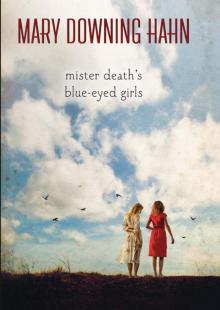 Mister Death's Blue-Eyed Girls
Mister Death's Blue-Eyed Girls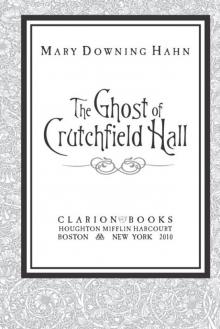 The Ghost of Crutchfield Hall
The Ghost of Crutchfield Hall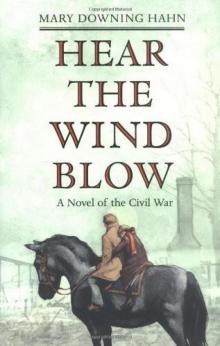 Hear the Wind Blow
Hear the Wind Blow Time of the Witch
Time of the Witch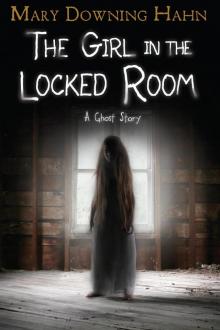 The Girl in the Locked Room: A Ghost Story
The Girl in the Locked Room: A Ghost Story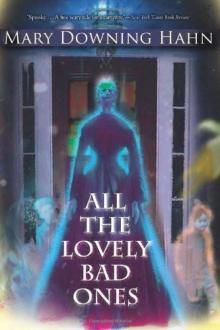 All the Lovely Bad Ones
All the Lovely Bad Ones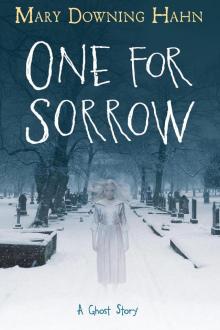 One for Sorrow
One for Sorrow Deep and Dark and Dangerous
Deep and Dark and Dangerous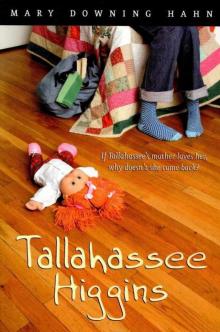 Tallahassee Higgins
Tallahassee Higgins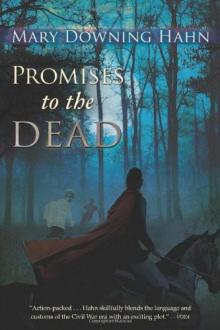 Promises to the Dead
Promises to the Dead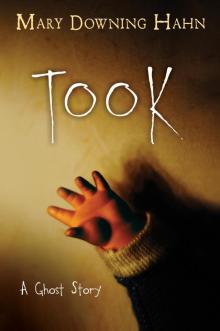 Took: A Ghost Story
Took: A Ghost Story Following My Own Footsteps
Following My Own Footsteps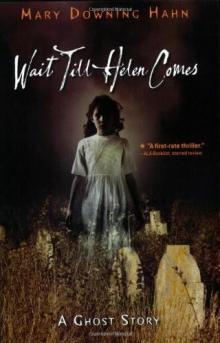 Wait Till Helen Comes: A Ghost Story
Wait Till Helen Comes: A Ghost Story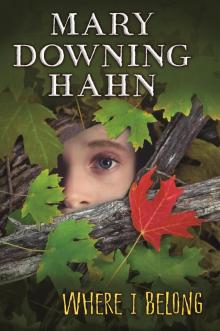 Where I Belong
Where I Belong The Spanish Kidnapping Disaster
The Spanish Kidnapping Disaster Look for Me by Moonlight
Look for Me by Moonlight The Old Willis Place
The Old Willis Place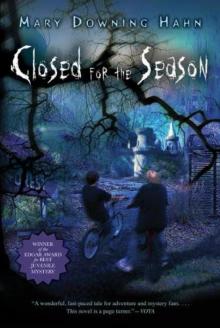 Closed for the Season
Closed for the Season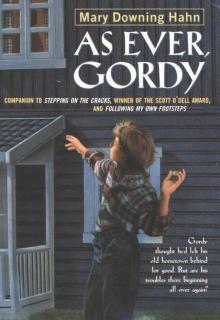 As Ever, Gordy
As Ever, Gordy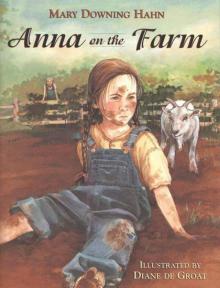 Anna on the Farm
Anna on the Farm The Doll in the Garden
The Doll in the Garden Daphne's Book
Daphne's Book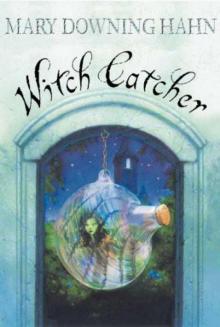 Witch Catcher
Witch Catcher The Gentleman Outlaw and Me--Eli
The Gentleman Outlaw and Me--Eli Wait Till Helen Comes
Wait Till Helen Comes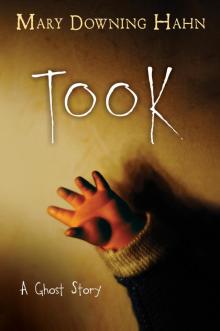 Took
Took A Haunting Collection
A Haunting Collection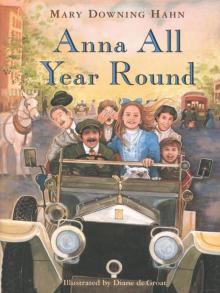 Anna All Year Round
Anna All Year Round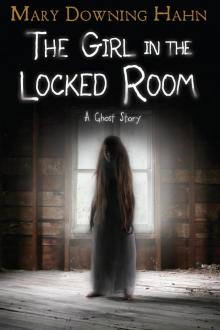 The Girl in the Locked Room
The Girl in the Locked Room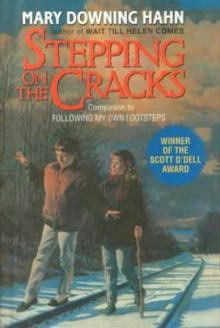 Stepping on the Cracks
Stepping on the Cracks